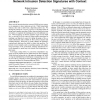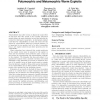57 search results - page 11 / 12 » Knowledge Flow Analysis for Security Protocols |
CCS
2003
ACM
13 years 10 months ago
2003
ACM
Many network intrusion detection systems (NIDS) use byte sequences as signatures to detect malicious activity. While being highly efficient, they tend to suffer from a high false...
ICS
2010
Tsinghua U.
14 years 2 months ago
2010
Tsinghua U.
: Design of secure systems can often be expressed as ensuring that some property is maintained at every step of a distributed computation among mutually-untrusting parties. Special...
CCS
2005
ACM
13 years 10 months ago
2005
ACM
Vulnerabilities that allow worms to hijack the control flow of each host that they spread to are typically discovered months before the worm outbreak, but are also typically disc...
TPHOL
2009
IEEE
13 years 11 months ago
2009
IEEE
Abstract. We consider a formalisation of a notion of observer (or intruder) theories, commonly used in symbolic analysis of security protocols. An observer theory describes the kno...
RSA
2000
13 years 4 months ago
2000
We analyze various stochastic processes for generating permutations almost uniformly at random in distributed and parallel systems. All our protocols are simple, elegant and are b...


